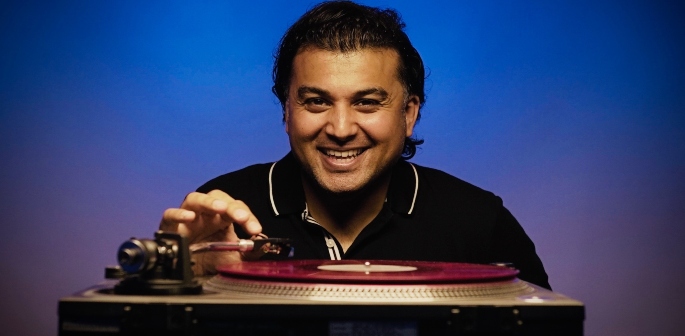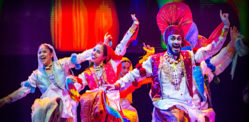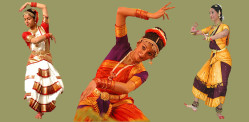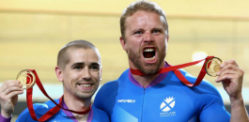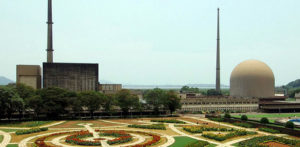"It’s amazing to hear his vision has come full circle"
Radio host and TV presenter, Ravi Sagoo, is releasing two celebratory shows focusing on 50 years of Scottish Bhangra and the incredible story of Bhangra DJ, Vipen Kumar.
‘Bhangra Beat: The Story of Scottish Bhangra’ will be streaming at 8 pm on BBC Radio Scotland. Whereas The Bhangra Boss: The Story of DJ Vips will be showing at 10:30 pm on BBC Scotland.
Both insightful programmes are releasing on July 26, 2021, and hope to capture the essence of Scottish Bhangra.
‘Bhangra Beat: The Story of Scottish Bhangra’ dives into the foundations of Bhangra music in Scotland, highlighting the fusion between the two cultures.
By interviewing pioneering artists such as Bombay Talkie and Tigerstyle, the show will explore the meteoric rise of Desi Scottish artists.
As well as how their sound has engulfed and transcended the traditional Bhangra characteristics for the past 50 years.
Although, one cannot explore Scottish Bhangra without focusing on the late legendary musician, DJ Vips.
Relocating from India to Edinburgh, DJ Vips formed into a monumental artist who was a bedrock for the UK Bhangra community.
The Bhangra Boss: The Story of DJ Vips follows the awe-inspiring journey of the ‘King of Scottish Bhangra’ and how his innovative nature trajected the sound and artists of Scottish Bhangra.
In addition, DJ Vips’ impressive aspirations led to the creation of his own record label, VIP Records.
Signing talented musicians such as Husn Nawabi, Foji and Raxstar, the lucrative label has racked up over 1 billion online streams.
This indicates the amount of creativity and ability DJ Vips instilled in those around him.
His passing in 2019 sent shockwaves throughout the music industry. However, this documentary fittingly pays an emotional tribute to the brilliance of the music visionary.
Bhangra lovers and music fans alike are eagerly anticipating both shows and cannot wait to participate in honouring Scottish Bhangra and the uplifting evolution it has gone through.
In an exclusive interview, DESIblitz spoke to the narrator and producer of both shows, Ravi Sagoo, about the impact of Scottish Bhangra and how both shows will pay homage to that.
What motivated you to create ‘Bhangra Beat: The Story of Scottish Bhangra’?
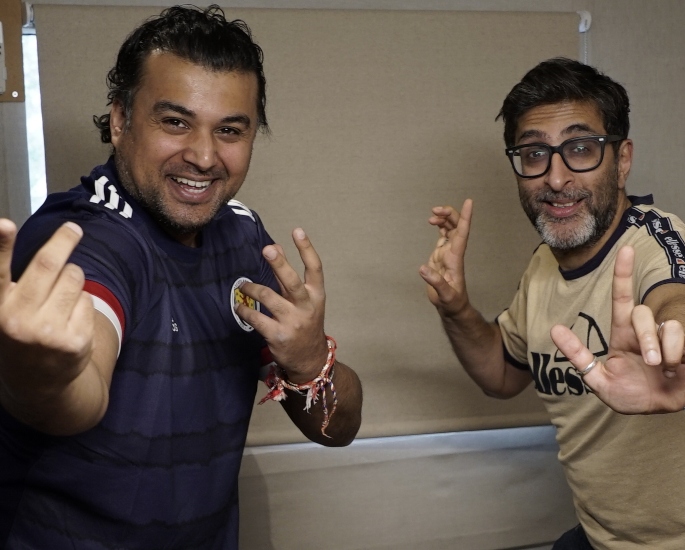
I grew up with Bhangra music at home through my parents and extended family who are originally all from Punjab and Kenya.
So, it’s always been an integral part of my musical DNA as it’s the music we’ve all danced to at weddings and parties from when we were kids to this very day.
As a result, I love Bhangra music. Particularly the early folk heroes of Kuldip Manak, Parkash Kaur, Chamkila to the modern greats including Gurdas Maan, Jazzy B, and Diljit Dosanjh.
I myself got involved with the Scottish Bhangra industry in the late 90s through the DJ collective ‘Desi Bombsquad DJ’s’. Which I helped set up (two of which, namely Raj and Pops Burmy, later went on to form ‘Tigerstyle’).
We did the usual circuit – DJ’ing at Asian weddings and events, we got on local radio with a few Bhangra radio shows in Glasgow as a result and then started promoting Bhangra club nights.
Bringing up the likes of DCS, PMC, Jazzy B, and Malkit Singh et al which were all really successful gigs.
As everyone knows the main Bhangra hub has always been Birmingham and London.
There had always been scenes here in Scotland (albeit a lot smaller) from the first wave of early immigration to Scotland’s first Bhangra band. Namely Bombay Talkie of the 80s and 90s who released two albums.
Then to Tigerstyle who had a massive impact on the UK and International Bhangra scene.
This then led to the hugely successful Edinburgh-based record label ran by Vipen Kumar aka DJ Vips, kicking off the VIP Records era in 2005.
Which has had a number of Bhangra heavyweights signed to their label alongside Scottish artists like Ryan Singh and DJ Kunal.
Between 2006 and 2009 I presented 3 series of ‘Ravi Sagoo Presents…’ – a Bhangra music show on BBC Radio Scotland.
My producer Nick Lowe and I were always keen to play Scottish artists and music alongside the English and International Bhangra acts.
For a period in the 2000s through Tigerstyle and VIP Records, there was a real resurgence of Scottish produced and promoted Bhangra music which was heard across massive platforms.
This included Tigerstyle performing at the ‘BBC Electric Proms’, a live session for John Peel’s BBC Radio 1 Show, and their music featured on Britain’s Got Talent.
This led to more homegrown artists emerging such as Gtown’s Bobby B playing at ‘T In The Park’ festival in Scotland.
So as a proud Scotsman I was really keen for Scotland and a wider audience to hear the Scottish Bhangra story from its early conception in the 60s around the restaurant scene and local community shows to pioneering acts such as Bombay Talkie, Typestyle, and DJ Vips.
How do you feel Scotland has contributed to the Bhangra music scene?
The mere mention of Bombay Talkie for a generation of Scot’s brings a smile to one’s face and evokes memories dancing at weddings to daytimers to their massive hit ‘Chargyie’.
It was a popular dance floor hit in England too and lead vocalists Sanjay Majhu and Charan Gill alongside the rest of the band opened the door for a future generation of Scottish Asian Music makers.
They are the true pioneers of Scottish Bhangra in this sense.
They were competing when the Bhangra band era was in full swing across the UK and they were up against some tough competition such as Alaap, Apana Sangeet, Heera, DCS and the likes.
So to have a lasting imprint on Scottish and UK Bhangra really does say something about their legacy which has included some noteworthy performances at festivals including T In The Park and touring across the UK.
Looking at the success of Tigerstyle from the turn of the millennium; they went on to create a unique digi-urban sound with their concepts of Bhangra music.
Tigerstyle took it to new global heights with production style and sound putting Scottish Bhangra firmly on the map in a big way.
They raised the bar by bringing back the true indigenous roots of the genre through first-class Punjabi percussion and lyrics alongside some truly talented singers from Gunjan, Gurjeet Sidhu “Tajpuri” to working with the likes of Harbjaan Maan.
Not only does their music make you want to dance, it’s thought-provoking too as they didn’t shy away from political discourse as their track ‘Warcries’ bore witness to in their first album The Rising which highlighted Sikh struggles and genocide.
Other artists such as Glasgow’s Krown have taken a lot of inspiration from Tigerstyle, and have produced and released Bhangra music with their own take on the Punjabi Folk influence.
From using talented vocalists to feel good dancefloor vibes and they’ve been really successful along the way releasing their music through big labels such as T-Series.
Which pioneering artists do you speak to in the show?
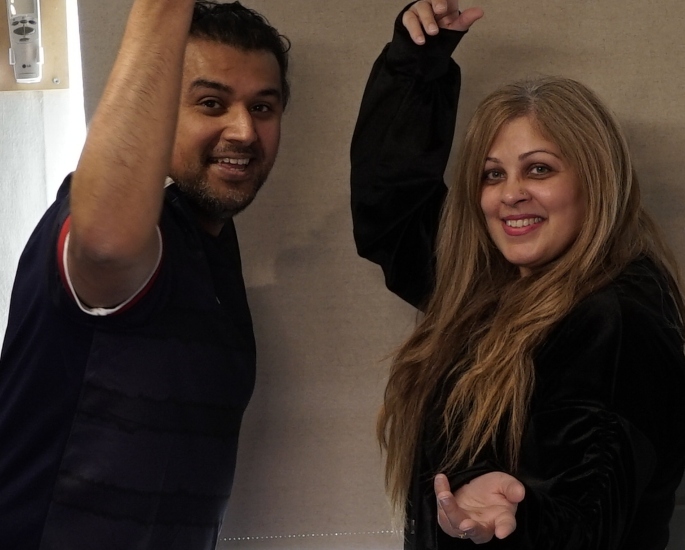
In the documentary, we speak to founding members of Bombay Talkie namely vocalists Sanjay Majhu and Charan Gill.
Also Raj and Pops of Tigerstyle, DJ Harri aka Krown to female Bhangra and now Bollywood actress Rameet Sandhu and back to Sanjay Majhu who tells us about his new band ‘The Bhangra Beatles’.
We also speak to folk who were part of the scene during the peak periods.
From writer and actor Sanjeev Kholi recalling his stand-in keyboard days with Bombay Talkie and attending the daytimers.
To actor Manjot Sumal talking us through how Bhangra music made it onto one comedy sketch on BBC Scotland’s Comedy Scot Squad and teaching his fellow actor Grado how to do the Punjabi Yodel of ‘Brrrrughhah!’.
We’ve also featured archive interviews of when I interviewed the late DJ Vips for BBC Radio Scotland back in 2006 talking about his vision for his then newly launched VIP record label.
Considering it’s a now billion-plus streaming label it’s amazing to hear his vision has come full circle and some.
How has the Desi sound developed in Scotland from 50 years ago?
From the early sounds of a dholki, dhol, harmonium, and some local singers on a mic performing after hours in restaurants, local studios and events it’s morphed into an identity of its own.
Bombay Talkie followed the Bhangra band blueprint of the 90s but kept their Scottish roots laced throughout their music with bagpipes and traditional Scottish melodies.
Alongside core Bhangra sounds mixed by the synthesiser sound of the 90s which was the standard across all music back then.
The Desi sound took a new turn when Tigerstyle began introducing hip-hop, urban, drum and bass Bhangra music to their self-titled ‘digi-bang’ concept genres.
It was a true amalgamation of urban sounds from Latino music to hip-hop and dance but including one true element along the way – the real ‘Tait’ Punjabi folk whilst constantly evolving their sound.
Rameet Sandhu has used similar urban concepts in her music mixed along with dance and pop vibes but she’s kept that folk Bolivian delivery within her vocal style.
You meet with some trending artists like Rameet Sandu, how do think the future of Scottish Bhangra will evolve?
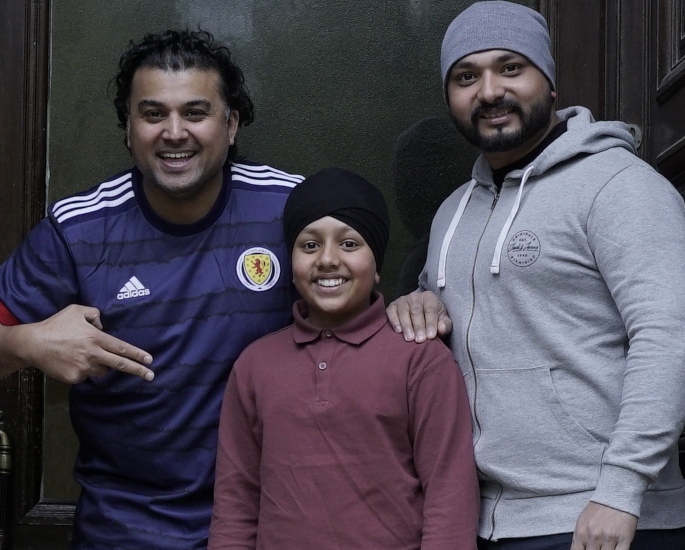
Music and cultures continue to travel and integrate (especially with the internet revolution).
We are now at a point where we have music and a generation who are so musically literate that the sound of Bhangra will continue to enthral.
What excites me most is how Scottish musicians and artists lace the folk roots of Bhangra within.
We’ve got young artists like 14-year-old Beats By Jay who fuses grime and urban genre’s with Bhangra when he is DJing.
So I’m really looking forward to hearing what the ‘young team’ as we say in Scotland are going to be producing next.
What was your drive behind making “The Bhangra Boss: The Story of DJ Vips”?
I knew Vipen from the wedding and bhangra scene in Scotland. One of my earliest memories of meeting Vipen was when I was 15.
At the time heading to a Bhangra gig with friends and I didn’t have any ID and was clearly 3 years shy of being 18!
I spotted Vips with his crew carrying their flight cases to the nightclub doors so I went to help and bypassed the bouncers as they thought I was part of the crew!
In later years I had the honour of interviewing him for both BBC Radio Scotland and The BBC Asian Network.
He was genuinely one of the good guys, whenever you needed any music or promos he would drive to the BBC in Glasgow and hand them in personally as opposed to simply email them across.
So, when the news broke through of Vipen passing, there was a shock and sadness which resonated both in Scotland and in England such was the impact of his record label VIP Records.
My producer Nick Lowe and I obviously very saddened to hear of his passing wanted to put a fitting tribute together that would showcase not only Vipen’s work and legacy but also his personal life story too.
So often our relationships are based on work or through industry, this documentary really shines a light on Vipen’s earnest character, what drove him, and his love of all things music.
How do you think DJ Vips captured the essence of Bhangra music?
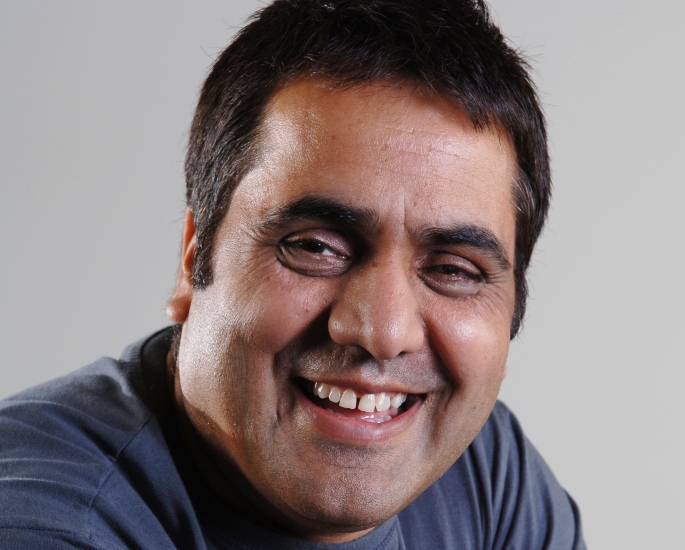
He kept true his Indian and Punjabi roots of mixing Bollywood and Bhangra music with all things dance, urban and hip hop when he DJ’d.
He continued this when he started producing music by mixing the western influences with old skool Bhangra.
Vipen used to go back to India to get vocals recorded and launching new singers at the same time.
He advanced the sound of Bhangra roots music as evident in his reworkings of songs like ‘Lus Lus’.
He also didn’t lose his own DNA – being a DJ he made music for people to dance too and his album Party Time very much reflected the infectious party sounds of Bhangra music and dance.
Was there a particular story that stood out or surprised you in the show?
Given Vipen’s very busy schedule what surprised me, and our production team was how he managed to find time for everyone he encountered.
For someone who was a workaholic, DJing, his social work and running businesses, he had also found time to develop strong bonds and lasting relationships which is a common theme not only from his family but from his industry colleagues too.
What’s the importance of exploring DJ Vips’ journey?
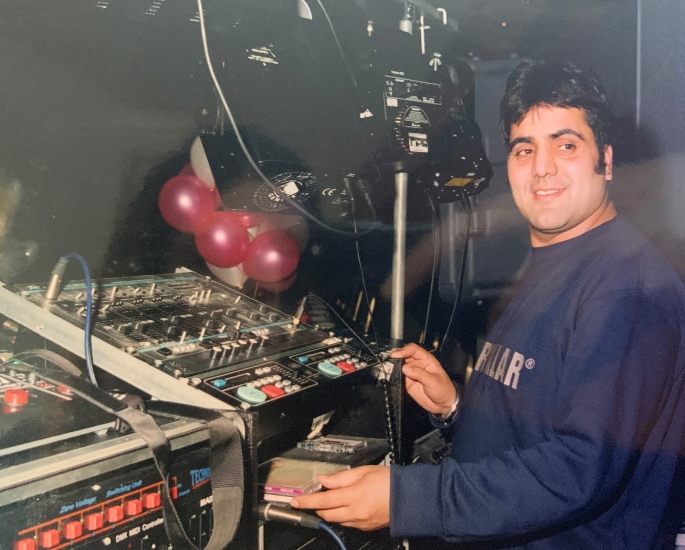
To explore how one man’s love of Bhangra music turned into a full-time career and since, has become one the most successful Bhangra record labels in the UK all from his base in Edinburgh.
He had many challenges along the way, which would deter most people but not Vipen.
His genuine love and enthusiasm for music and people clearly shines through as we discover through his family and industry contributors.
What was your most favourite part of both shows and why?
In the Radio documentary, we hear memories of the Daytimer Gigs and the stories of how people skipped school and college.
They cheekily hid the glamour under their unforms and turned day into night dancing away to Bhangra!
For the TV documentary about Vipen, the greatest joy was to pay respect to a much-loved DJ and Record label boss.
Getting a real insight into his drove him through his family which we really appreciate.
What new things did you experience or learn when making these shows?

How Bhangra music truly transcends across different people and cultures.
Bombay Talkie regale a story of how their music went down so well in places you wouldn’t think was possible namely rural Ireland!
Vipen Kumar managed to make an impact in every aspect of his life which is a unique trait.
Music industry friendships are often fleeting or fickle but he managed to develop lifelong friendships until his passing as contributors such as Tigerstyle and Tru-Skool share on the programme.
What do you hope audiences take away from the programmes?
At its peak, Scotland was a world leader in Bhangra music which many people don’t know and how Bhangra music crosses over to everyone who hears it.
From weddings to random gigs at music festivals – Bhangra music draws in people and passion which leads to one thing…dancing Bhangra style!
From the DJ Vips TV programme the extent of his worldwide success, from a small record shop and DJ business in Edinburgh to one of the world’s biggest streaming Bhangra record label….a remarkable legacy.
Through creativity, flair, and innovation, it is easy to see how monumental Scottish Bhangra has been for music and Desi culture.
The programmes were created to highlight how artists and bands have been solidifying the true vibrancy of Bhangra music within Scotland for over 50 years.
However, the significance of these musicians has been echoed worldwide which Ravi Sagoo hopes to illustrate.
Longstanding listeners will be able to recapture their teenage years whilst new Bhangra fans will be introduced to a new historical dimension of Bhangra culture.
Both shows will share the experiences, stories, and memories that reimagined the state of Desi culture and music. Whilst also giving us an intimate insight into how Bhangra offers more than just great beats and lyrics.
Tune in to ‘Bhangra Beat: The Story of Scottish Bhangra’ here and catch The Bhangra Boss: The Story of DJ Vips here.




















































